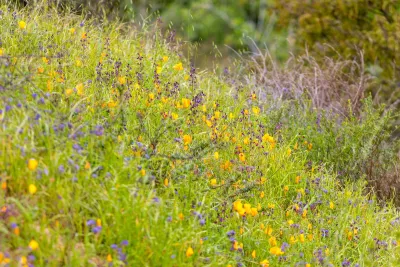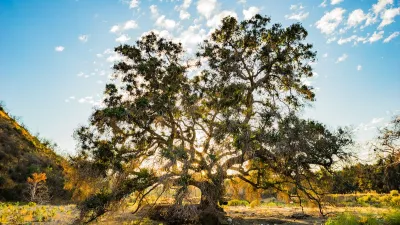TreePeople’s 4th Annual Urban Soil Symposium explored how climate gardening, soil health, and collaborative land management strategies can enhance urban resilience in the face of climate change.

The 4th Annual Los Angeles Urban Soil Symposium, hosted by TreePeople on March 7, 2025, brought together over 130 environmental practitioners to explore how landscapes can be reimagined in the face of climate change. Centered on the theme of Climate Gardening, the symposium examined the intersection of ecology, community, and land management. Discussions focused on how native plants, fungi, and green infrastructure can build resilience, particularly in areas impacted by events like the recent LA fires.
The event emphasized collaboration over conventional presentations, fostering connections between researchers, policymakers, and nonprofit leaders. Attendees explored TreePeople’s urban soils research and viewed informative posters from a variety of contributors. Examples of presentations included UCLA’s Kirsten Schwarz on democratizing soil testing post-wildfires and TreePeople’s own team advocating for circular soil systems that repurpose construction sediment into healthy, usable soil.
Beyond the science, the symposium encouraged attendees to reflect on their personal and philosophical approaches to land stewardship. An interactive art installation, The Mosaic Machine, prompted participants to consider how traditional, modern, ecological, or agrarian landscaping choices affect local watersheds. The momentum and ideas sparked at this year’s symposium suggest a promising path forward—where Climate Gardening helps reshape LA’s urban fabric into one that’s greener, healthier, and more adaptive to the changing climate.
FULL STORY: 4th Annual Urban Soil Symposium Digs Into Climate Gardening

Maui's Vacation Rental Debate Turns Ugly
Verbal attacks, misinformation campaigns and fistfights plague a high-stakes debate to convert thousands of vacation rentals into long-term housing.

Planetizen Federal Action Tracker
A weekly monitor of how Trump’s orders and actions are impacting planners and planning in America.

Chicago’s Ghost Rails
Just beneath the surface of the modern city lie the remnants of its expansive early 20th-century streetcar system.

Bend, Oregon Zoning Reforms Prioritize Small-Scale Housing
The city altered its zoning code to allow multi-family housing and eliminated parking mandates citywide.

Amtrak Cutting Jobs, Funding to High-Speed Rail
The agency plans to cut 10 percent of its workforce and has confirmed it will not fund new high-speed rail projects.

LA Denies Basic Services to Unhoused Residents
The city has repeatedly failed to respond to requests for trash pickup at encampment sites, and eliminated a program that provided mobile showers and toilets.
Urban Design for Planners 1: Software Tools
This six-course series explores essential urban design concepts using open source software and equips planners with the tools they need to participate fully in the urban design process.
Planning for Universal Design
Learn the tools for implementing Universal Design in planning regulations.
planning NEXT
Appalachian Highlands Housing Partners
Mpact (founded as Rail~Volution)
City of Camden Redevelopment Agency
City of Astoria
City of Portland
City of Laramie





























